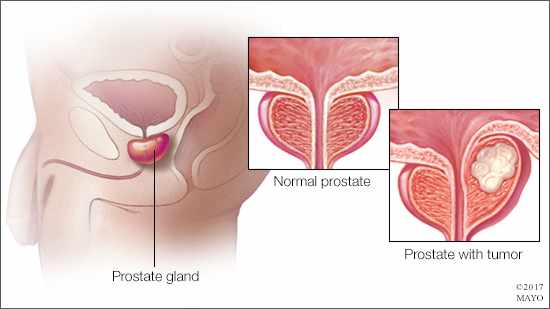-
Cancer
Mayo Clinic Q and A: Treating prostate cancer that spreads
 DEAR MAYO CLINIC: I am 63 and was diagnosed with prostate cancer two years ago. I had my prostate removed shortly after the diagnosis. I found out recently the cancer is now in my lymph nodes. What can I do to prevent it from spreading further?
DEAR MAYO CLINIC: I am 63 and was diagnosed with prostate cancer two years ago. I had my prostate removed shortly after the diagnosis. I found out recently the cancer is now in my lymph nodes. What can I do to prevent it from spreading further?
ANSWER: When prostate cancer spreads out of the prostate gland, the most common places for it to occur are in the lymph nodes and bones. Although prostate cancer that has spread can be difficult to cure, treatment is available that may help slow or stop further spread of the cancer.
Prostate cancer is cancer that occurs in a man’s prostate gland — a small walnut-shaped gland that makes fluid to nourish and transport sperm. Prostate cancer is one of the most common types of cancer in men. It often grows slowly and remains confined to the prostate gland in its early stages. But the cancer may spread if cancer cells break away from the tumor in the prostate and travel to other areas of the body through the lymph system or the bloodstream.
When prostate cancer spreads to the lymph nodes, as in your case, treatment often includes hormone therapy. Radiation therapy or surgery may be necessary in some people, too, depending on an individual’s circumstances.
Hormone therapy stops your body from making the male hormone testosterone or blocks the effects of testosterone on prostate cancer. This is useful, because prostate cancer cells rely on testosterone to help them grow. Cutting off the hormone supply may cause the cancer to shrink or help to slow its growth.
Hormone therapy for prostate cancer often includes taking medication that prevents the testicles from receiving messages to make testosterone. Those medications are called luteinizing hormone-releasing hormone, or LH-RH, agonists and antagonists. Examples of these drugs include leuprolide, goserelin and degarelix.
Other medications that block testosterone from reaching cancer cells may be given along with a luteinizing hormone-releasing hormone agonist or given before taking a luteinizing hormone-releasing hormone agonist. These medications are called anti-androgens. Examples include bicalutamide, enzalutamide, flutamide and nilutamide.
Hormone therapy usually is continued for as long as the treatment works. Over time, prostate cancer may adapt to hormone therapy and begin growing despite treatment. If that happens, your doctor may suggest a different combination of hormone therapy drugs to see if the cancer responds.
Depending on where the cancer has spread, along with other factors, radiation therapy may be combined with hormone therapy to treat prostate cancer that affects the lymph nodes. Radiation therapy uses high-powered beams of energy, such as X-rays or protons, to kill cancer cells.
The kind of radiation used to combat prostate cancer that has spread is called external beam radiation. It uses a large machine that moves around your body to direct energy beams at the areas affected by cancer. External beam radiation treatments typically are given five days a week for several weeks or more.
In addition to hormone therapy and radiation therapy, in some cases, chemotherapy also may be recommended to treat advanced prostate cancer. Immunotherapy, which uses the body’s immune system to kill cancer cells, also may be useful in certain situations.
Your specific treatment likely will be based on how fast the cancer is growing and how much it has spread, as well as your medical history, overall health and other treatment you’ve received. Your doctor can talk with you in detail about possible treatment options, as well as their risks and benefits. Working together, you and your doctor can create a treatment plan that best fits your needs. — Dr. J. Fernando Quevedo, Medical Oncology, Mayo Clinic, Rochester, Minnesota







